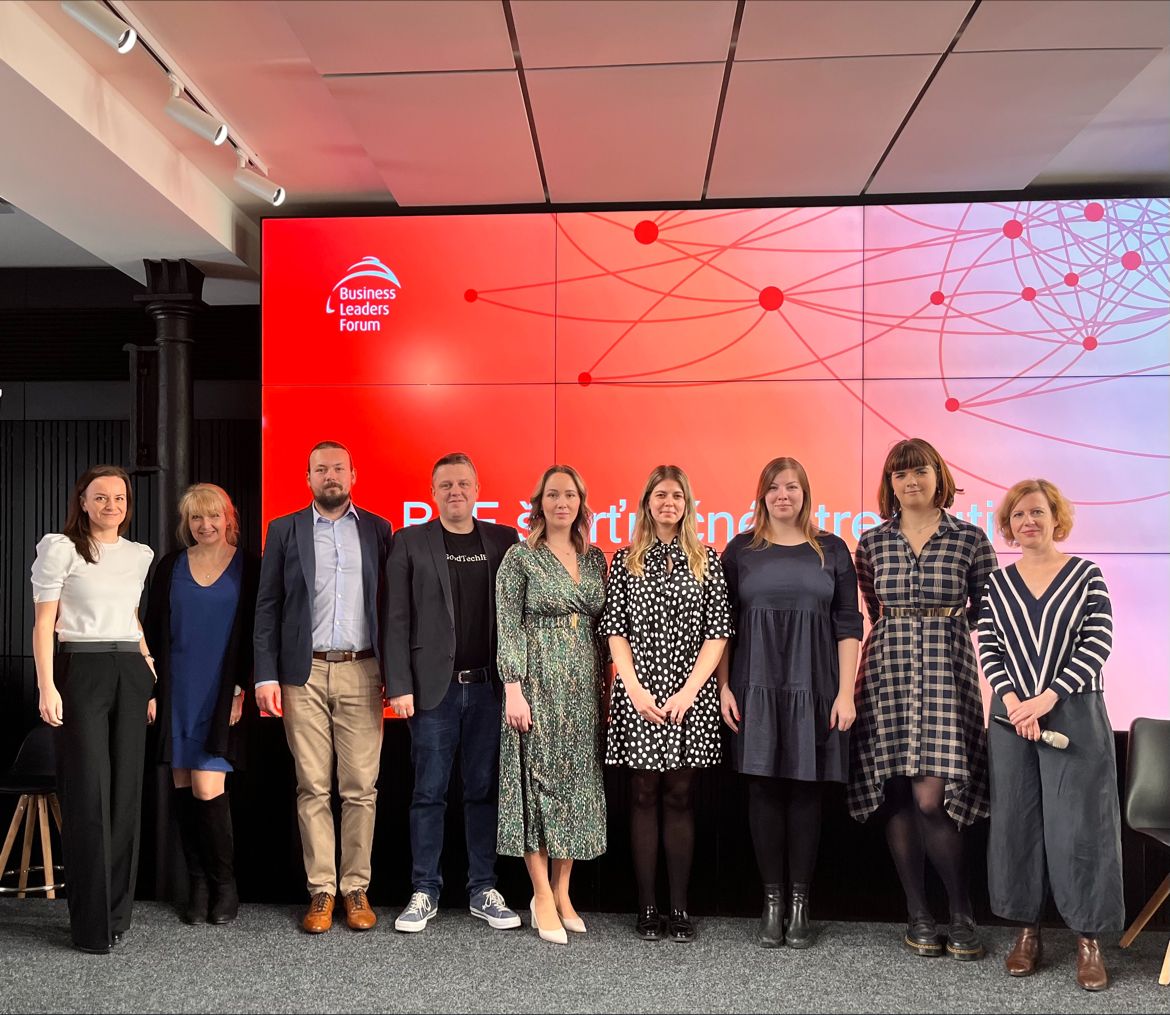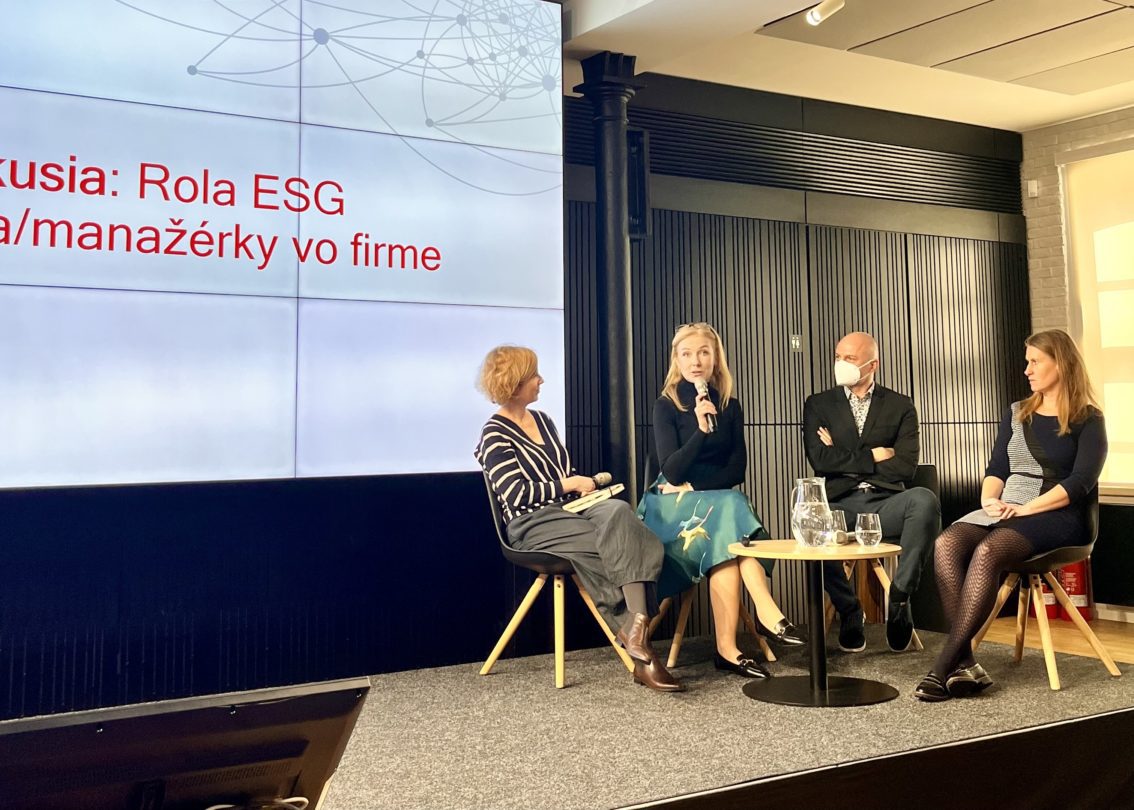ESG must work across the company, it is not the agenda of just one department
The first quarterly meeting of Business Leaders Forum members this year focused on the role of the ESG manager in the company. At the same time, four new companies joined the association.
Four new companies joined the association at the Business Leaders Forum networking meeting on the 21st of March, hosted by the Tatra bank. These are FCC Slovakia, IBM International Services Centre, Markíza Slovakia, and Slovenská sporiteľňa. Business Leaders Forum currently has 52 members.
FCC provides various waste management solutions for municipalities, industrial, commercial and retail sectors. One of the strategic areas of the company’s responsible entrepreneurship is the circular economy. The company focuses on strengthening separate collection, reuse of waste and processing and developing technologies for obtaining energy from waste. IBM is one of the largest IT companies in the world. In Slovakia, it is based in three towns – Bratislava, Banská Bystrica and Košice – and is one of the largest employers in Slovakia. In the field of diversity and inclusion, the company creates support employee groups that cover the so-called Diversity Council. The employee initiative Lesswaste@IBM, which promotes environmental topics, has also found its stable place in the company.
TV Markíza’s priorities in responsible entrepreneurship include sustainability, carbon neutrality in television production, mental health, and employee engagement. It ensures the sustainable behaviour of suppliers by incorporating the rules of production directly into the contract. It conveys climate change and the importance of sustainable behaviour in television content. The Slovenská sporiteľna network consists of more than 200 branches throughout Slovakia. The bank employs more than 3,600 people. In the area of responsible entrepreneurship, its priorities include diversity, inclusion and equal treatment, but also sustainable finance and affordable housing. The bank provides its employees with a wide range of benefits to effectively harmonise private and work life.

Four new companies joined the Business Leaders Forum association.
Where in a company should the ESG agenda be placed?
The topic of the quarterly meeting was the role of the ESG manager in the company – who should be the owner of this agenda, what powers and competencies these managers should have, and what are the biggest challenges they have to face. Tomáš Kvašňovský, sustainability manager at Tatra Bank, shared his experience. His position at the bank was created two years ago. “People often ask me why the bank deals with ESG, not money. I try to explain to them that if money moves the economy and banks are the so-called bloodstream of these finances, it is necessary to treat them responsibly and sustainably. It is a commitment to current and future generations,” he said.
The position of ESG manager can be placed in different ways within the company’s organisational structure – under the communication, HR, strategy, or legal department. The ESG manager at the Tatra bank reports directly to the CEO and Chairman of the Board of Directors. “However, it is important to say that just one person cannot cover the entire topic. Considering the breadth of the agenda, it is teamwork,” added T. Kvašňovský. He considers conscious management, in the case of the bank, the board of directors that understands the importance of sustainability topics to be crucial to his work.
The work of an ESG manager requires a great deal of cooperation with various stakeholders – internal, such as marketing, HR, legal department, economic administration, product and finance department, but also external, such as clients, customers, suppliers, investors, the non-profit sector and a broad public. Sustainability topics are present across the entire company. The Tatra bank implements them in its financial products (mortgages, current accounts, green bonds) and communication within the #premodruplanetu (tr. #forablueplanet) campaign.
ESG must work across the company
Tomáš Kvašňovský was joined in the discussion by Zuzana Sobotová, head of the sustainability and CSR department at Lidl, and Milica Danková, sustainability manager at Plzeňský Prazdroj. The discussants agreed that the topic of ESG is complex and must work across the company, it should not be concentrated in just one department. In Plzeňské Prazdroj, the topic of sustainability falls under communication and corporate relations, but the company has created a wider team consisting of people from purchasing, marketing, innovation, and production. Responsibility for meeting sustainability goals extends to top management. It works similarly in Lidl. “I see my colleagues as specialists in topics that are closely related to sustainability. It is with their help and expertise that we set specific measurable goals, which we subsequently report to the management,” said Zuzana Sobotová.
ESG managers are supposed to be the face and voice of sustainability and a central point where these topics meet. However, motivating colleagues to take action and want to change things is often difficult. “People generally don’t like to deviate from the usual ruts, and some processes can be painful. But it is our task to be a catalyst for change,” said M. Danková, adding that it is necessary to constantly educate colleagues and convince them that it makes sense, especially in the long term.
Reporting, as happened in Lidl, can also contribute to a change in thinking. “People suddenly saw their result materialised. Today, the colleagues who contributed to the creation of the report with their expertise already report to us on their own because they are proud of their work and feel they are an asset,” mentioned Z. Sobotová. She adds that the ESG manager must make his colleagues feel that they can change small things, but they lead to something big.
Balance between E, S and G
A current topic among ESG managers is finding the right balance between individual topics because most attention focuses on the environmental field. “It reflects the need for an external client. It’s easier to understand. Social topics are mostly associated with HR and volunteering inside the company. Externally, it is often the foundation that pushes S-topics further, and in recent times also the geopolitical situation, which has brought these topics to the fore,” added T. Kvašňovský.
M. Danková, on the other hand, pointed out that environmental reporting does not concern ordinary employees much. It is important for them to feel safe at work and to feel that they have a strong partner behind them in the form of an employer who creates a fair and motivating work environment. Therefore, companies should not forget to prepare projects for them as well.
Banks introduce ESG questionnaires for companies
The companies’ approach to sustainability will soon be considered by banks as well. The Slovak Banking Association (SBA), in cooperation with representatives of the banks associated in the association, created a model ESG questionnaire, which is to serve as a standard for the Slovak banking market. The questionnaire contains 75 questions and is intended to provide banks with an overview of the impact of their clients’ businesses in the field of ESG. These data will enable them to evaluate the so-called ESG risk profile of the client more accurately.
“The aim of creating the questionnaire was also the education of clients who will fill out such questionnaires in the future. Companies that are gradually preparing for the reporting obligation will thus be able to familiarise themselves in advance with the individual concepts and ways in which they are supposed to collect data,” said Ján Maxim from the Slovak Banking Association.
Already today, banks require ESG data from clients. The banks plan to introduce the collection of ESG data in the form of a standardised questionnaire from around the middle of 2023. Considering that most large companies will issue the first reports according to the new CSRD directive in 2026 for 2025, the banks expect that many companies will not yet be able to complete the questionnaires completely. However, it will provide banks with at least a basic sustainability profile of the firm.










